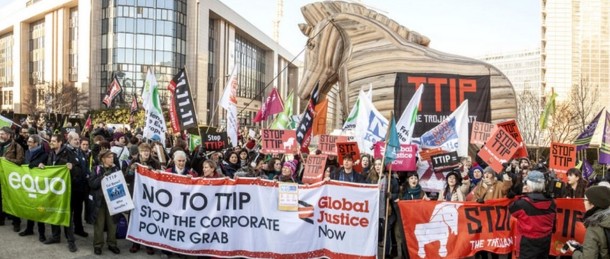Secret Trade Talks Undermine Legitimacy Of TTIP, Reinforce The Reality Of A Creeping Corporatocracy
Citing Corporate Takeover, UN Official Calls for Halt In Secret Trade Talks
‘We don’t want a dystopian future in which corporations and not democratically elected governments call the shots,’ said Alfred de Zayas, UN independent expert
Common Dreams

Independent Expert on the promotion of a democratic and equitable international order Alfred De Zayas. (Photo: UN/Amanda Voisard)
A United Nations official has called for a moratorium on secret negotiations over a United States-European Union “free trade” deal, citing concerns that the corporate tribunals likely to be included in the final pact would boost the power of multinationals at the expense of democracy and human rights.
Alfred de Zayas, the UN’s independent expert on the promotion of a democratic and equitable international order, made the statements in an interview with The Guardian published Monday. He took aim at the Transatlantic Trade and Investment Partnership (TTIP) agreement, which would be the largest “free trade” deal in world history, as the U.S. and E.U. together account for nearly half of global GDP.
“We don’t want a dystopian future in which corporations and not democratically elected governments call the shots,” said de Zayas, a U.S.-based lawyer and historian born in Cuba. “We don’t want an international order akin to post-democracy or post-law.”
De Zayas expressed particular concerns about the proposed “investor-state dispute settlement” system (ISDS), which would provide a framework for corporations to sue governments over alleged lost profits and overrule national laws, courts, and democratic processes. Such corporate tribunals have become hallmarks of so-called “free trade” agreements, included in 3,000 such deals world-wide, such as the infamous North American Free Trade Agreement (NAFTA).
“Most worrisome are the ISDS arbitrations, which constitute an attempt to escape the jurisdiction of national courts and bypass the obligation of all states to ensure that all legal cases are tried before independent tribunals that are public, transparent, accountable and appealable,” said de Zayas.
This is not the first time de Zayas has issued such warnings. Last month, he released a statement in which he charged that fast track adoption and secret negotiation of “free trade” treaties “is tantamount to disenfranchising the public and constitutes a violation of human rights law, which stipulates that every citizen shall have the right and the opportunity to take part in the conduct of public affairs.”
The administration of U.S. President Barack Obama is currently pressing for passage of “Fast Track” legislation that would allow the White House to ram through secret deals currently under negotiation. In addition to the TTIP, the Obama administration is also currently negotiation the Trans-Pacific Partnership and the Trade in Services Agreement.
Labor, environmental, community, and human rights organizations around the world have mobilized for years against these and other such pacts, with organized opposition to the TTIP mounting on both sides of the Atlantic.
But de Zayas warned in April, “There is a general lack of awareness concerning the adverse effects that existing bilateral and multilateral free trade and investment agreements already have on the enjoyment of human rights, including the right to health, the right to education and the right to live in a safe, clean, healthy and sustainable environment.”
